2001-06-01 14:01
Pyoungtaek to concentrate on playing pivotal role with China
Korea Shipping Gazette (KSG): Thank for giving us time for this interview while you have been so busy. We have noticed that Pyoungtaek is likely to lead in the West Sea in the 21st century. Understanding the importance of Pyoungtaek location, its role might be increasing. Could you tell me what your highest priority for the Port of Pyoungtaek development strategy is?
Kim Sun-ki, Mayor of Pyoungtaek: The city of Pyoungtaek is focused on developing as a logistics hub port and major trade center for Northeast Asia in the 21st century. The purpose of the Port of Pyoungtaek is to gear up for port construction. Currently, the Port of Pyoungtaek is operating 15 berths, with an additional 2 berths, capable of accommodating 30,000-ton vessels to be completed by this June. We are doing our best for the port to be on track. We have kicked off construction for a fifth berth in the general wharf, with the help of POSCO, and called on Hyundai Motors to develop two additional berths for 30,000-ton vessels. In addition, three berths in the East Terminal, originally planned for construction with private capital, have garnered government support, acquiring 5 billion won this year.
In the second phase of the development project, we are trying to raise private and foreign capital for the Posung Industrial Complex dedicated terminals and to complete earlier the West Terminal for 30,000-ton vessels.
Last November, we opened the direct container trade bound for Hong Kong and Qingdao. We are going to increase calling frequencies and find out about opening various China services including Tianjin.
This July we are going to launch the service between Pyoungtaek and Rongyan, and keep adding extra car-ferry services to Rizhao, Dalian, and Qinhuangdao. For all of these services, we are under way to build an international passenger terminal of 1,489 pyoung, scheduled for completion by the end of June.
Also, we are driving to establish a logistic complex to handle logistics, industry, and commercial business. Above all, we are cautiously considering applying for Tax Free Zone.
― KSG: Pyoungtaek has being developed as a state-supply port since it first opened to LNG vessels in 1986. This port seems to be in competition as well as complementary cooperation with the Port of Inchon because of its geographical location. Pyoungtaek is considered to supply differentiated port services and to supplement port facilities.
Mayor Kim: I agree with you that its facilities and port services are below satisfactory levels. However, we are building a CIQ (Customs, Immigration, and Quarantine) office to provide one-stop customs clearance services. And we are also going to complete mid and long-term commercial railway projects earlier than expected to help inland and port facilities connections.
- KSG: The Port of Pyoungtaek is preparing to be a hub port for Chinese trade with container services. And car-ferry services are also known to launch. At present, the Port of Inchon allows only car-ferry liners to carry container cargoes, not container liners. I know that Pyoungtaek is an emerging container port for trade with China. What are your plans for container liners and boddari-traders (small luggage traders)?
- Mayor Kim: Boddari-traders are operating in private or small group units. We are taking under consideration finishing the international passenger terminal and running shuttle buses for the convenience of boddari-traders. And for all kinds of traders and tourists, we are thinking about developing a logistics and distribution complex and a leisure sports town. To lure container liners, we are pushing for launching extra trades and acquiring dedicated terminals and facilities.
―KSG: Compared with other domestic ports, what benefits are there for shippers or shipping lines?
- Mayor Kim: For shippers, wharfage and container tax will be totally exempted. This exemption will help shippers to save on port facility costs worth 6.3 million won based on entering cargoes of 30,000 tons and clearing cargoes of 5,000 tons. And compared with Inchon and Kunsan, inland transportation bound for the capital and central regions will be shortened and save 49.9 percent and 56.0 percent of costs, respectively.
For shipping liners, port dues, anchorage charges, and berthing fees will be 100 percent exempt, and vessel operation times might be shortened without detentions and stock accumulations. If 30,000-ton vessels are moored [RS4]for 4 days, 24 million won in logistic costs may be cut.
―KSG: Most of all, to continue developing as a competitive port for trade with China, it is vitally important to cooperate with the port union and to have an efficient port operating system. What are you doing to make the operating systems efficient and cooperate with the port union?
- Mayor Kim: At present, the operation of Pyoungtaek has been under the control of the Pyoungtaek Harboring Co., which consists of six companies such as Korea Express since September 1997. However, we found many problems in operating ports, and now we are pushing to form a new corporation to handle development and management concerns; the province of Kyoung-gi and the city of Pyoungtaek are investing this together. Also, we have been encountering conflicts with Kyoung-in Union flexibility.
- KSG: I know that the blueprint for the Port of Pyoungtaek is well known. Could be more specific about this?
- Mayor Kim: We predict that Pyoungtaek might handle 110 million tons of cargoes in 2020, and that port facilities will be required for 80 million tons and container cargoes from feeders will be above 500 thousand TEU.
If the port development project is completed in 2011, with the completion of 62 berths and the capacity to stevedore 62 million ton of cargoes annually, Pyoungtaek will become a hub-port in international trade. Pyoungtae k will be equipped with industrial complexes, further developments for container and car-ferry trades, as well as railways and highways.
Infrastructure establishment is also just as important as port and logistic centers. For this, we will continuously push to digitalize the port operation systems and register as TFZ.
- KSG: It's been a pleasure speaking with you. Thank-you for sharing with us.
Kim Sun-ki, Mayor of Pyoungtaek: The city of Pyoungtaek is focused on developing as a logistics hub port and major trade center for Northeast Asia in the 21st century. The purpose of the Port of Pyoungtaek is to gear up for port construction. Currently, the Port of Pyoungtaek is operating 15 berths, with an additional 2 berths, capable of accommodating 30,000-ton vessels to be completed by this June. We are doing our best for the port to be on track. We have kicked off construction for a fifth berth in the general wharf, with the help of POSCO, and called on Hyundai Motors to develop two additional berths for 30,000-ton vessels. In addition, three berths in the East Terminal, originally planned for construction with private capital, have garnered government support, acquiring 5 billion won this year.
In the second phase of the development project, we are trying to raise private and foreign capital for the Posung Industrial Complex dedicated terminals and to complete earlier the West Terminal for 30,000-ton vessels.
Last November, we opened the direct container trade bound for Hong Kong and Qingdao. We are going to increase calling frequencies and find out about opening various China services including Tianjin.
This July we are going to launch the service between Pyoungtaek and Rongyan, and keep adding extra car-ferry services to Rizhao, Dalian, and Qinhuangdao. For all of these services, we are under way to build an international passenger terminal of 1,489 pyoung, scheduled for completion by the end of June.
Also, we are driving to establish a logistic complex to handle logistics, industry, and commercial business. Above all, we are cautiously considering applying for Tax Free Zone.
― KSG: Pyoungtaek has being developed as a state-supply port since it first opened to LNG vessels in 1986. This port seems to be in competition as well as complementary cooperation with the Port of Inchon because of its geographical location. Pyoungtaek is considered to supply differentiated port services and to supplement port facilities.
Mayor Kim: I agree with you that its facilities and port services are below satisfactory levels. However, we are building a CIQ (Customs, Immigration, and Quarantine) office to provide one-stop customs clearance services. And we are also going to complete mid and long-term commercial railway projects earlier than expected to help inland and port facilities connections.
- KSG: The Port of Pyoungtaek is preparing to be a hub port for Chinese trade with container services. And car-ferry services are also known to launch. At present, the Port of Inchon allows only car-ferry liners to carry container cargoes, not container liners. I know that Pyoungtaek is an emerging container port for trade with China. What are your plans for container liners and boddari-traders (small luggage traders)?
- Mayor Kim: Boddari-traders are operating in private or small group units. We are taking under consideration finishing the international passenger terminal and running shuttle buses for the convenience of boddari-traders. And for all kinds of traders and tourists, we are thinking about developing a logistics and distribution complex and a leisure sports town. To lure container liners, we are pushing for launching extra trades and acquiring dedicated terminals and facilities.
―KSG: Compared with other domestic ports, what benefits are there for shippers or shipping lines?
- Mayor Kim: For shippers, wharfage and container tax will be totally exempted. This exemption will help shippers to save on port facility costs worth 6.3 million won based on entering cargoes of 30,000 tons and clearing cargoes of 5,000 tons. And compared with Inchon and Kunsan, inland transportation bound for the capital and central regions will be shortened and save 49.9 percent and 56.0 percent of costs, respectively.
For shipping liners, port dues, anchorage charges, and berthing fees will be 100 percent exempt, and vessel operation times might be shortened without detentions and stock accumulations. If 30,000-ton vessels are moored [RS4]for 4 days, 24 million won in logistic costs may be cut.
―KSG: Most of all, to continue developing as a competitive port for trade with China, it is vitally important to cooperate with the port union and to have an efficient port operating system. What are you doing to make the operating systems efficient and cooperate with the port union?
- Mayor Kim: At present, the operation of Pyoungtaek has been under the control of the Pyoungtaek Harboring Co., which consists of six companies such as Korea Express since September 1997. However, we found many problems in operating ports, and now we are pushing to form a new corporation to handle development and management concerns; the province of Kyoung-gi and the city of Pyoungtaek are investing this together. Also, we have been encountering conflicts with Kyoung-in Union flexibility.
- KSG: I know that the blueprint for the Port of Pyoungtaek is well known. Could be more specific about this?
- Mayor Kim: We predict that Pyoungtaek might handle 110 million tons of cargoes in 2020, and that port facilities will be required for 80 million tons and container cargoes from feeders will be above 500 thousand TEU.
If the port development project is completed in 2011, with the completion of 62 berths and the capacity to stevedore 62 million ton of cargoes annually, Pyoungtaek will become a hub-port in international trade. Pyoungtae k will be equipped with industrial complexes, further developments for container and car-ferry trades, as well as railways and highways.
Infrastructure establishment is also just as important as port and logistic centers. For this, we will continuously push to digitalize the port operation systems and register as TFZ.
- KSG: It's been a pleasure speaking with you. Thank-you for sharing with us.
많이 본 기사
- ‘고환율·저운임’ 글로벌 물류기업 일제히 부진한 실적 신고한국해양대, 장금상선등 해운사와 해양인재 양성방안 머리맞대“1000명 직원 생계 뒤흔들어” HMM노조 부산이전 결사반대日 ONE 운항 9100TEU급 컨선 화재…공동해손 선언전재수 해수부 장관 사의…“해양수도권 차질없이 육성되길”무역의 날, 현대글로비스 60억불탑·대한항공 동탑훈장조선기자재硏·이마린·그린에너지솔루션, 친환경선박 배출수 기술개발...아시아나IDT, 산업안전세미나 개최…‘플랜투두’ 확산 전략 공유아로아랩스, 중기부 창업지원프로그램 선정…연구개발 자금 확보인천항만공사, 전기차 화재대응 안전역량 강화 나선다
- 에어프레미아, 인천-美 워싱턴노선 내년 4월 신규 취항울산항만공사, 감사인대회서 기관대상·내부통제경영대상등 3관왕칼럼/ 과로운항 알림서비스로 안전사고 예방한다KMI-코레일, 해양·철도 연계 물류 혁신 협력케이티넷, ‘글로벌 통상환경 대응’ 경영혁신위원회 출범인사/ 동영해운한국선급, 극지운항 선박 기술검토 서비스 내년 개시UPA, 울산·동해·포항해수청과 북극항로시대 대비 환동해 협력 강화여수해경, 동절기 해양사고 예방 ‘총력’한국해大 임재욱 교수, 한국무역학회 수석부회장 당선








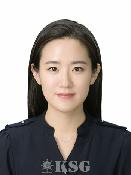
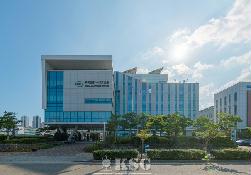
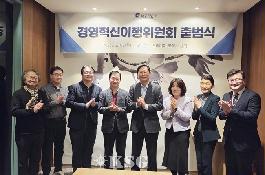
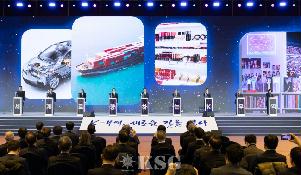
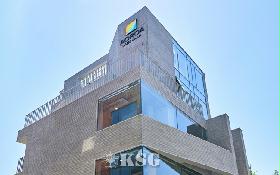
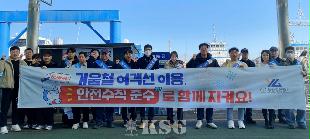
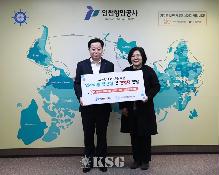
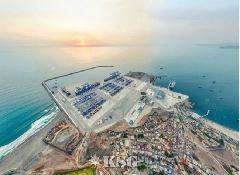
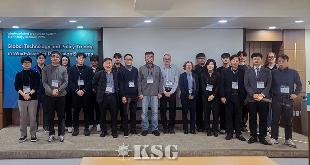
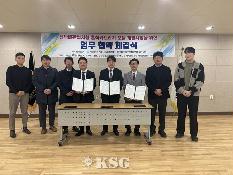


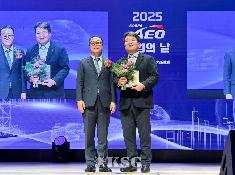
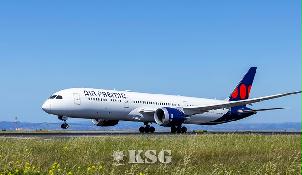
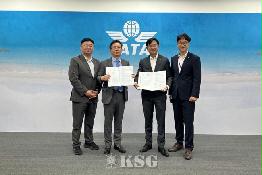
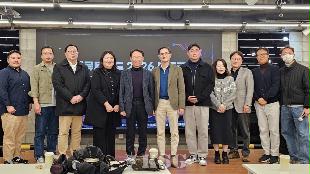
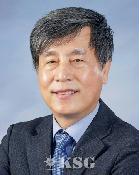




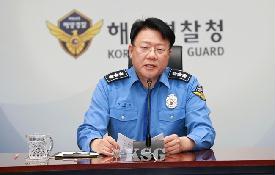
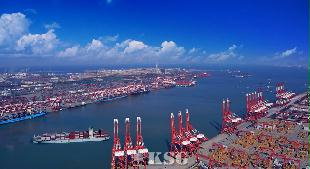
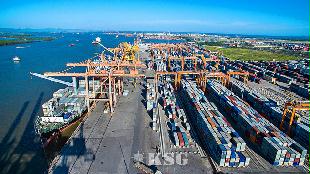
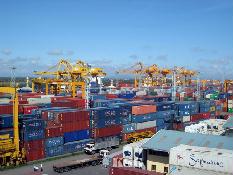






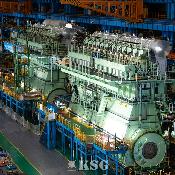
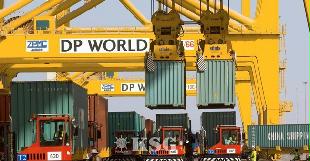
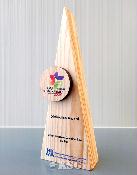
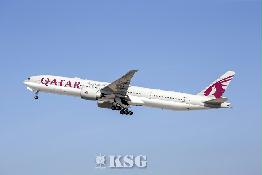
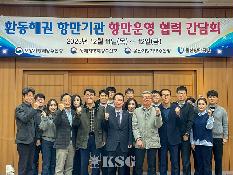





















0/250
확인